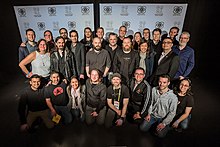Santa Monica Studio
 | |
| Company type | Subsidiary |
|---|---|
| Industry | Video games |
| Founded | 1999 in Santa Monica, California, US |
| Founder | Allan Becker |
| Headquarters | , US |
Key people | Yumi Yang (studio head) |
| Products | God of War series |
Number of employees | 250+[1] (2024) |
| Parent | Sony Computer Entertainment (1999-2005) PlayStation Studios (2005-present) |
| Website | sms |

Santa Monica Studio is an American video game developer of Sony Interactive Entertainment based in Los Angeles. It is best known for developing the God of War series. The studio was founded in 1999 by Allan Becker and was located in Santa Monica, California, until relocating to Playa Vista in 2014.
History
Santa Monica Studio was founded in 1999 by Allan Becker, a long-time Sony employee who wanted "to break out of the corporate Foster City group" of Sony Computer Entertainment. The studio was established in an office next to the developer Naughty Dog before moving into a brick building in the suburbs of Santa Monica, California.[2] The building at Penn Station would be occupied for fifteen years.[3] For its first game, the racing title Kinetica, Santa Monica Studio decided to skip the PlayStation console and built the game for the console's then-upcoming successor, the PlayStation 2, instead. A game engine was developed "to give the [PlayStation 2] some legs" for Kinetica and future releases. While the game was developed during the studio's team building phase, producer Shannon Studstill focused on the game's release to prove to Sony that Santa Monica Studio was capable of delivering a product on schedule and within budget. Kinetica was released on time in 2001, with the studio staying under the allocated budget. After publication, Santa Monica Studio shifted to its next project, God of War, while re-using the engine from Kinetica.[2]
The External Development group, a department within Santa Monica Studio separate from internal development teams,[4] acts as both a video game publisher and business incubator for indie game studios, notably Thatgamecompany and its game Journey.[2][5] Other incubated teams include Broodworks, Eat Sleep Play, Fun Bits, Giant Sparrow, Incognito Entertainment, Q-Games, and Ready at Dawn.[2][6][7] Becker left Santa Monica Studio in 2011.[5] By March 2012, Becker had joined Sony's Japan Studio, while Shannon became Santa Monica Studio's "Senior Director of Product Development".[2] In January 2014, Santa Monica Studio announced that it would move from their Penn Station offices to The Reserve, a 20-acre facility on Jefferson Boulevard in Playa Vista, Los Angeles. The 30,000 square feet (2,800 m2) of office space were "four or five times the size" of their previous Santa Monica office, according to Studstill. At the time, the studio employed roughly 240 people.[6] An undisclosed numbers of staffers were laid off in February that year due to the cancelation of a new intellectual property, including Stig Asmussen, who headed the canceled project.[7][8] The studio relocation was completed on July 22, 2014, coupled with a new logo, dubbed SMS "Vanguard".[3] Santa Monica Studio would also close down this group in 2016 and sold the rights to What Remains of Edith Finch and Wattam back to their developers, as well as publishing rights to Annapurna Interactive where the group's employees had relocated.[9]
In March 2020, Studstill left Santa Monica Studio to lead a new development studio under Stadia. Subsequently, a long-time employee and previous director of product development for Santa Monica Studio, Yumi Yang, was installed as the developer's studio head.[10]
Games developed
| Year | Title | Platform(s) |
|---|---|---|
| 2001 | Kinetica | PlayStation 2 |
| 2005 | God of War | PlayStation 2, PlayStation 3, PlayStation Vita |
| 2007 | God of War II | |
| 2010 | God of War III | PlayStation 3, PlayStation 4 |
| 2013 | God of War: Ascension | PlayStation 3 |
| 2018 | God of War | PlayStation 4, Windows |
| 2022 | God of War Ragnarök | PlayStation 4, PlayStation 5, Windows |
External Development games
References
- ^ "Santa Monica Studio - Who We Are".
- ^ a b c d e Nix, Marc (March 21, 2012). "The House That God of War Built: Sony Santa Monica". IGN. Archived from the original on August 4, 2020. Retrieved October 17, 2020.
- ^ a b Studstill, Shannon (July 22, 2014). "Sony Santa Monica unveils its new logo". PlayStation Blog. Archived from the original on October 17, 2020. Retrieved October 17, 2020.
- ^ "15 Years of Creative Partnerships". Santa Monica Studio. Sony Interactive Entertainment LLC. Archived from the original on August 20, 2016. Retrieved July 30, 2021.
- ^ a b Robinson, Martin (March 15, 2013). "Inside Santa Monica Studios, Sony's development commune". Eurogamer. Archived from the original on April 16, 2016. Retrieved October 17, 2020.
- ^ a b Graser, Marc (January 28, 2014). "Sony Game Division Finds New Westside Home for Santa Monica Studio". Variety. Archived from the original on February 10, 2019. Retrieved October 17, 2020.
- ^ a b Moriarty, Colin (February 24, 2014). "Layoffs Hit God of War Studio Sony Santa Monica". IGN. Archived from the original on November 14, 2019. Retrieved October 17, 2020.
- ^ Yin-Poole, Wesley (February 26, 2014). "God of War developer Sony Santa Monica suffers layoffs". Eurogamer. Archived from the original on December 30, 2017. Retrieved October 17, 2020.
- ^ Sinclair, Brandon (December 1, 2016). "Annapurna Pictures gets into game publishing". Gameindustry.biz. Archived from the original on July 26, 2019. Retrieved August 14, 2017.
- ^ Valentine, Rebekah (March 4, 2020). "Yumi Yang named new head of Sony Santa Monica Studio". GamesIndustry.biz. Archived from the original on April 29, 2020. Retrieved October 17, 2020.
